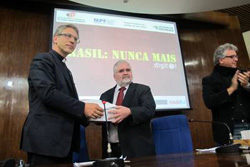Substantial information on torture and other human rights abuses during 20 year of military rule in Brazil was entrusted to the Brazilian attorney general at a ceremony in São Paulo on Tuesday (June 14).
There was also a call for a national truth commission in Brazil to shed more light on past atrocities during the ceremony.
The files of documents and microfilms, dating to the days of Brazil’s military dictatorship in the 1970s and 1980s, have been stored abroad in the archives of the World Council of Churches (WCC) in Geneva, Switzerland and the Center of Research Libraries (CRL) in Chicago since plans for a clandestine collection of court records was proposed to the WCC in 1978.
Regional prosecutor Marlon Weichert worked closely with the WCC and CRL in arranging the repatriation of records which include evidence that had gone missing from files held by the Supreme Military Court of Brazil.
The restored court records are soon to be made available for public consultation on an Internet site called “Brasil: Nunca Mais Digital” [Brazil: Never Again-digital]. The name pays tribute to an earlier book detailing state crimes committed in the era of military rule.
Among the 19 speakers in a four-hour ceremony were the Rev. Olav Fykse Tveit, general secretary of the WCC, and the Rev. Walter Altmann, a leading Brazilian Lutheran and the moderator of the WCC central committee.
In his speech, Tveit expressed gratitude to all those involved in the process of gathering court records ― lawyer Eny Moreira, Cardinal Dom Paulo Evaristo Arns, Presbyterian Church (U.S.A.) pastor and missionary the Rev. Jaime Wright, and long-time WCC staff member Charles R. Harper ― also a PC(USA) minister ― and many others.
Harper, WCC coordinator for human rights in Latin America from 1973 to 1992, was represented at the event by his granddaughter Nina who received an enthusiastic ovation on his behalf.
Wadih Damous, a regional president of the Brazilian Lawyers’ Order, told the gathering of more than 200 members of the public and media, “We are pursuing the right to see those who committed crimes answer for what they have done. Impunity for torturers of the past sends a clear message to those who commit torture today.”
Testimony offered on Tuesday included heart-rending accounts from two current ecumenical officials in Brazil who suffered torture in the 1970s, Eliana Rolemberg of the development agency CESE and Anivaldo Padilha of Koinonia, another ACT Alliance member organization. Both found it “easier to be tortured” physically than to endure their torturers’ threats against their families, including small children.
Several speakers called for the establishment of a national truth commission to shed greater light on events of the past, to explore the consequences of brutality and to ensure justice for former victims.
Bishop Julio Murray, president of the Latin American Council of Churches (CLAI), spoke of his experience as a member of the truth commission in Panama that examined violations during the military rule in that country from 1964 to 1994.
Interviewed after the ceremony, Altmann expressed his feelings as a Brazilian and as an officer of the WCC: “I was profoundly touched by the event as a whole, by the speeches and the strong and painful witness we heard, as well as by the stated commitments that we wish to honor. This is an important mark for the Brazilian people and nation, and I am proud of the role the WCC played and continues to play.”
Tveit added that the occasion had exceeded his expectations: “It showed the value of what we keep in our archives, but also that it is essential to work together. In reviewing this history and the reality of what happened, we see more clearly the role of the ecumenical movement in this particular issue, offering support to people and churches and providing a framework for effective action.”

